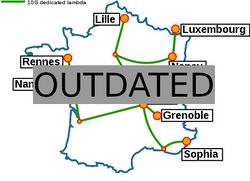Grid5000:Home
|
Grid'5000 is a large-scale and flexible testbed for experiment-driven research in all areas of computer science, with a focus on parallel and distributed computing including Cloud, HPC and Big Data and AI. Key features:
Grid'5000 is merging with FIT to build the SILECS Infrastructure for Large-scale Experimental Computer Science. Read an Introduction to SILECS (April 2018)
Older documents:
|
Random pick of publications
Five random publications that benefited from Grid'5000 (at least 2517 overall):
- Hubert Nourtel, Pierre Champion, Denis Jouvet, Anthony Larcher, Marie Tahon. Analyse de l'anonymisation du locuteur sur de la parole émotionnelle. JEP 2022 - Journées d'Études sur la Parole, Jun 2022, Île de Noirmoutier, France. hal-03636737 view on HAL pdf
- Ilhem Fajjari, Wassim Aroui, Joaquim Soares, Vania Marangozova. Use Cases Requirements. UGA (Université Grenoble Alpes). 2024. hal-04450028 view on HAL pdf
- Corentin Mercier. Gestion de l'énergie sur la plate-forme de calcul scientifique PlaFRIM. Architectures Matérielles cs.AR. 2022. hal-03770831v3 view on HAL pdf
- Igor Fontana de Nardin, Patricia Stolf, Stéphane Caux. Evaluation of Heuristics to Manage a Data Center Under Power Constraints. 13th International Green and Sustainable Computing Conference (IGSC 2022), Oct 2022, Pullman, United States. 10.1109/IGSC55832.2022.9969362. hal-03841713 view on HAL pdf
- Esteban Marquer, Safa Alsaidi, Amandine Decker, Pierre-Alexandre Murena, Miguel Couceiro. A Deep Learning Approach to Solving Morphological Analogies. 30th International Conference on Case-Based Reasoning (ICCBR2022), Sep 2022, Nancy, France. pp.159--174, 10.1007/978-3-031-14923-8_11. hal-03660625 view on HAL pdf
Latest news
Failed to load RSS feed from https://www.grid5000.fr/mediawiki/index.php?title=News&action=feed&feed=atom: Error parsing XML for RSS
Grid'5000 sites
Current funding
As from June 2008, Inria is the main contributor to Grid'5000 funding.
INRIA |
CNRS |
UniversitiesUniversité Grenoble Alpes, Grenoble INP |
Regional councilsAquitaine |


